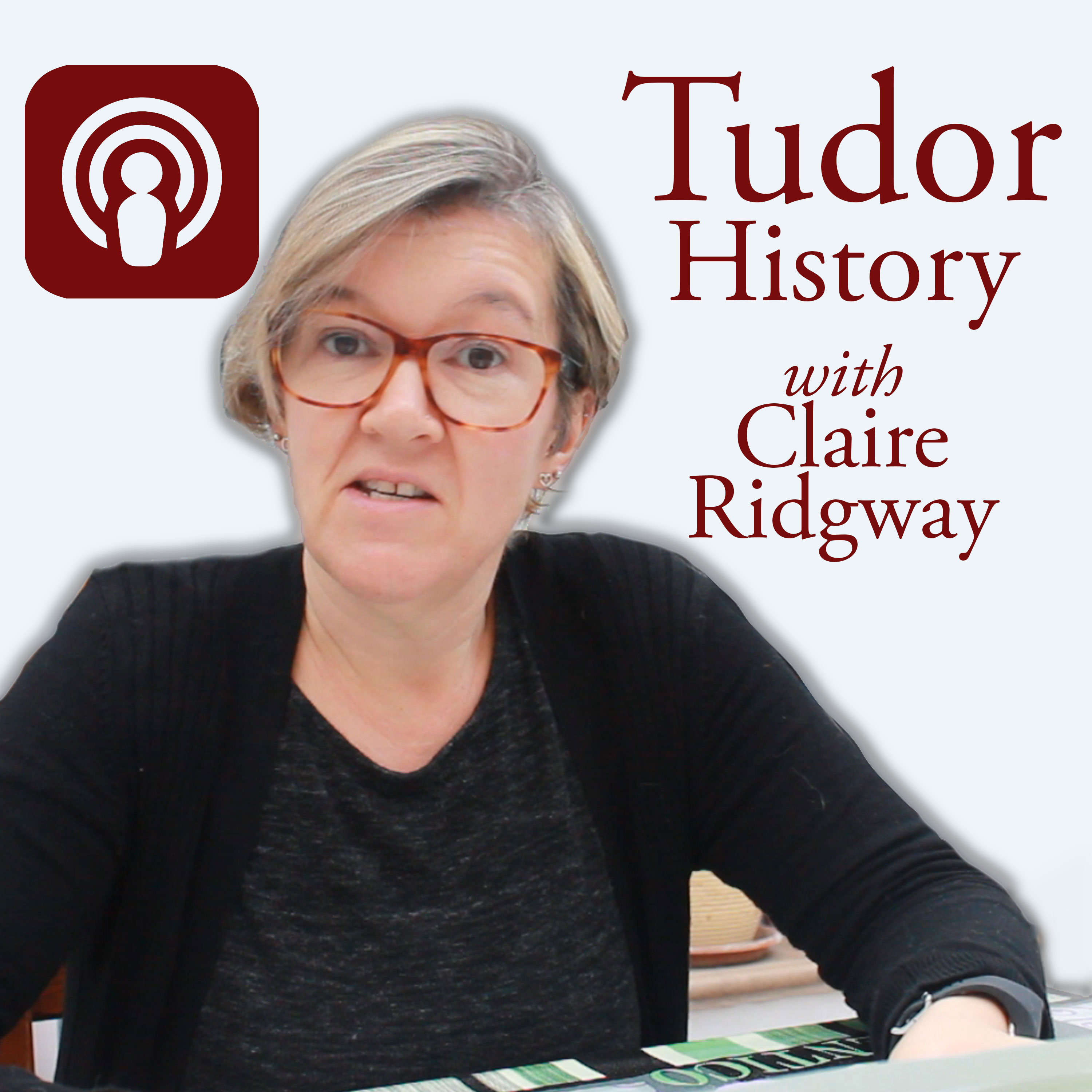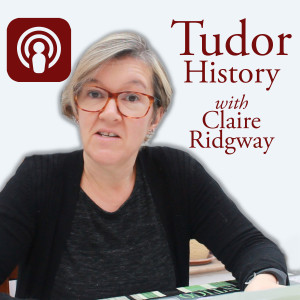Tudor History with Claire Ridgway

Step back into a world of intrigue, passion, and ruthless ambition — welcome to Tudor England. Join historian and bestselling author Claire Ridgway as she uncovers the riveting stories of the Tudor dynasty. From the scandalous love affairs of King Henry VIII to the tragic fall of Anne Boleyn, the fierce reign of Elizabeth I, and the lesser-known secrets of Tudor court life, this podcast brings history to life in vivid detail. Hear dramatic tales of betrayal, execution, forbidden love, and political manoeuvring that shaped England forever. Discover daily Tudor history with fascinating “On This Day” episodes — unique insights you won’t find in typical history books. Get behind-the-scenes stories from Claire’s own research trips to historic sites like the Tower of London, Hampton Court Palace, Hever Castle, and more. Enjoy interviews with top historians and experts in Tudor studies, plus lively Q&A sessions tackling listeners’ burning Tudor questions. 🖋 Who is Claire Ridgway? Claire is the author of the bestselling On This Day in Tudor History series and numerous other Tudor books loved by readers around the world. She founded The Tudor Society, connecting enthusiasts with experts through live online events, and runs the hugely popular history websites The Anne Boleyn Files and www.ClaireRidgway.com. Her mission: to uncover the human stories behind the crown — the hopes, fears, and triumphs of not only kings and queens but also the courtiers, rebels, and ordinary people who lived under the Tudor rose. What can you expect? - Gripping accounts of famous events like the Field of Cloth of Gold, the Dissolution of the Monasteries, or the Babington Plot. - Intimate portraits of Tudor figures: Anne Boleyn’s charm and downfall, Thomas Cromwell’s rise and brutal fall, Elizabeth I’s cunning survival. - Dark mysteries and unsolved deaths — who really killed Amy Robsart? Was Katherine Howard truly guilty? - Special episodes on Tudor fashion, food, medicine, and the day-to-day lives of Tudor men and women. Join thousands of Tudor fans worldwide Never miss an episode — subscribe now and become part of a global community that can’t get enough of Tudor drama. Explore more with Claire’s books, free resources, and live historical events at www.ClaireRidgway.com. Ready to travel back 500 years? Press play and let the adventure begin.
Step back into a world of intrigue, passion, and ruthless ambition — welcome to Tudor England. Join historian and bestselling author Claire Ridgway as she uncovers the riveting stories of the Tudor dynasty. From the scandalous love affairs of King Henry VIII to the tragic fall of Anne Boleyn, the fierce reign of Elizabeth I, and the lesser-known secrets of Tudor court life, this podcast brings history to life in vivid detail. Hear dramatic tales of betrayal, execution, forbidden love, and political manoeuvring that shaped England forever. Discover daily Tudor history with fascinating “On This Day” episodes — unique insights you won’t find in typical history books. Get behind-the-scenes stories from Claire’s own research trips to historic sites like the Tower of London, Hampton Court Palace, Hever Castle, and more. Enjoy interviews with top historians and experts in Tudor studies, plus lively Q&A sessions tackling listeners’ burning Tudor questions. 🖋 Who is Claire Ridgway? Claire is the author of the bestselling On This Day in Tudor History series and numerous other Tudor books loved by readers around the world. She founded The Tudor Society, connecting enthusiasts with experts through live online events, and runs the hugely popular history websites The Anne Boleyn Files and www.ClaireRidgway.com. Her mission: to uncover the human stories behind the crown — the hopes, fears, and triumphs of not only kings and queens but also the courtiers, rebels, and ordinary people who lived under the Tudor rose. What can you expect? - Gripping accounts of famous events like the Field of Cloth of Gold, the Dissolution of the Monasteries, or the Babington Plot. - Intimate portraits of Tudor figures: Anne Boleyn’s charm and downfall, Thomas Cromwell’s rise and brutal fall, Elizabeth I’s cunning survival. - Dark mysteries and unsolved deaths — who really killed Amy Robsart? Was Katherine Howard truly guilty? - Special episodes on Tudor fashion, food, medicine, and the day-to-day lives of Tudor men and women. Join thousands of Tudor fans worldwide Never miss an episode — subscribe now and become part of a global community that can’t get enough of Tudor drama. Explore more with Claire’s books, free resources, and live historical events at www.ClaireRidgway.com. Ready to travel back 500 years? Press play and let the adventure begin.
Episodes
Episodes



Friday Jul 19, 2024
Did Henry VIII Really Have Syphilis? The Myth Busted!
Friday Jul 19, 2024
Friday Jul 19, 2024
Did Henry VIII have syphilis? 🤔 Today, I'm debunking a persistent myth about the infamous Tudor king. Spoiler: The answer is a resounding NO! 🙅♂️ Join me as I explore the origins of this misconception and the real story behind Henry's health issues. Plus, I have some exciting news for you! 🎉
📅 LIVE Chat Announcement: On 28th July, I'll be going live exclusively for my YouTube channel members! Let's chat about Henry VIII, sip on coffee or wine, and dive deep into Tudor history. 🍷☕️
📅 Date: 28th July
⏰ Time: 10pm UK / 5pm New York
🗣️ Duration: 1 hour
The Private Character of Henry the Eighth - https://archive.org/details/dli.ministry.05394/page/n5/mode/2up
#HenryVIII #TudorHistory #SyphilisMyth #Debunked #HistoryUncovered #JoinNow #LiveChat #ChannelMembers #TudorTrivia #HistoryFacts #MythBusting #WatchNow



Tuesday Jul 16, 2024
My Lady Jane – A Travesty to History or a Fun Romp?
Tuesday Jul 16, 2024
Tuesday Jul 16, 2024
Today, I’ve got a bit of a confession to make – I’ve started watching My Lady Jane on Amazon Prime and I’m loving it. From social media comments, I gather that as a historian, I’m meant to hate it, but nope, I love it!
Based on the book by Cynthia Hand, Brodi Ashton, and Jodi Meadows, it’s a fantasy with only a passing resemblance to actual history. Think The Princess Bride with shape-shifters and regicidal maniacs. It’s laugh-out-loud funny, packed with adventure, and has an amazing cast.
So, put history aside and just have fun with it. If it gets people googling Lady Jane Grey, then that's brilliant. Now, excuse me, episode 5 is waiting!
#MyLadyJane #TudorHistory #AmazonPrime #HistoricalFantasy #FunRomp



Friday Jul 12, 2024
Interesting Facts About the Boleyn Family
Friday Jul 12, 2024
Friday Jul 12, 2024
Today, I have some fascinating facts to share about the Boleyn family, a family close to my heart. These tidbits might surprise you and give you a deeper insight into their intriguing history.
Did you know that Anne Boleyn’s father inherited a unique family heirloom? Or that her mother was praised by a famous poet? There are also some mysteries about Mary Boleyn's later years. Anne herself might have met a legendary figure during her time in France, and her brother George was celebrated for his talents. Jane Boleyn played a significant role in the lives of others, and Elizabeth I honoured her mother in some special ways.
If these facts have piqued your interest, I’m excited to announce an 8-day online event in November dedicated to the Boleyn family! I’ll be diving into:
Thomas and Elizabeth Boleyn
Anne Boleyn's rise and fall
Mary Boleyn's legacy
George Boleyn's life and work
Jane Boleyn's controversial story
Elizabeth I, the Boleyn Queen
The enduring legacy of the Boleyns
There will be seven talks and eight Zoom Q&A sessions, offering plenty of opportunities to discuss Tudor history. If you register before 31st July, you can join us for $65, saving $15. Head to https://claireridgway.com/events/the-boleyns-a-family-of-two-queens/ for more details and to secure your spot.
I can’t wait to share more about the Boleyns with you and hear your thoughts! See you there!
#BoleynFamily #TudorHistory #AnneBoleyn #MaryBoleyn #GeorgeBoleyn #ElizabethI #TudorFacts #HistoryLovers #OnlineEvent



Tuesday Jul 09, 2024
The Mysterious Prophecies about Anne Boleyn
Tuesday Jul 09, 2024
Tuesday Jul 09, 2024
Dive into the mystical world of Tudor England with us as I explore the enigmatic prophecies surrounding Anne Boleyn!
In an era rife with superstition, discover how visions and omens foretold the rise and fall of one of history's most captivating queens. From eerie books of prophecy to foreboding dreams and cryptic verses, see how these predictions shaped the fate of Anne Boleyn and those around her.
Uncover the stories behind these chilling prophecies and decide for yourself: were they mere coincidence, or a glimpse into the future?
#AnneBoleyn #TudorHistory #Mysteries #Prophecies #HistoricalSecrets #OnThisDay



Monday Jul 08, 2024
The Fate of Henry Manox
Monday Jul 08, 2024
Monday Jul 08, 2024
What Happened to Catherine Howard’s Music Teacher?Ever wondered what became of the first man to be involved with Catherine Howard, her music teacher Henry Manox?While much is known about her tragic end and the fates of Francis Dereham and Thomas Culpeper, Manox’s story is often overlooked. In this video, I uncover the intriguing details of his relationship with the young queen, his attempts to cause trouble for her, and his ultimate fate during the tumultuous events of 1541.
Discover how Manox managed to escape the brutal consequences that others faced. Dive into Tudor history and uncover the secrets behind the scandal!
Don’t miss out on this untold tale. Hit play to learn more about Henry Manox’s fate!
#TudorHistory #CatherineHoward #HenryManox #TudorScandals #HistoryUncovered #MusicTeacher #RoyalIntrigue #HistoricalMysteries #WatchNow



Monday Jul 08, 2024
The Henry VIII and Anne Boleyn Choir Screen
Monday Jul 08, 2024
Monday Jul 08, 2024
Discover the stunning Henry VIII and Anne Boleyn Choir Screen at King’s College Chapel, Cambridge! This exquisite wooden rood screen, praised by Sir Nikolaus Pevsner as “the most exquisite piece of Italian decoration surviving in England,” is more than a beautiful artefact. It holds a fascinating link to Anne Boleyn and the Tudor dynasty. 🏰👑
Eric Ives suggested it was made to celebrate Henry VIII and Anne Boleyn’s marriage, featuring symbols of their union. However, stonecarver Lucy Churchill's research reveals a deeper message asserting their Divine Right to rule and issuing a stern warning to dissenters. 📜🔍
Dive into this historical gem and explore the rich symbolism behind it. Check out Lucy Churchill’s detailed research and imagery on her website!
https://www.lucychurchill.com/anne-boleyn-moost-happi-medal-reconstruction/kings-college-choir-screen-cambridge-uk/
Photo credits:
https://www.geograph.org.uk/photo/3437015 - King's College Chapel - ceiling & organ screen © Copyright The Carlisle Kid and licensed for reuse under this Creative Commons Licence.
https://www.geograph.org.uk/photo/3488853 King’s College Chapel © Copyright Richard Croft and licensed for reuse under this Creative Commons Licence.
#TudorHistory #AnneBoleyn #HenryVIII #HistoricalArtefacts #KingsCollegeChapel #Cambridge #ChoirScreen #DivineRight #HistoryRevealed #LucyChurchill



Monday Jul 08, 2024
The Mystery of Anne Boleyn's Engagement Ring
Monday Jul 08, 2024
Monday Jul 08, 2024
I dive into an intriguing Tudor mystery sparked by a question from Chris Celsie about a ring supposedly given to Anne Boleyn by Henry VIII. This diamond ring was displayed at an exhibition in Toronto in 1994 as Anne's engagement ring. But did such a ring really exist?
What We Know:
- Exhibition Clue: The Toronto Star article mentioned an engagement ring given to Anne Boleyn by Henry VIII.- Historical Records: Engagement rings weren't a common tradition in Tudor times.- Jewels for Anne: Henry VIII lavished jewels on Anne, with documented purchases and gifts.
Historical Findings:
- Eric Ives' Biography: Details on Anne’s jewellery, including pieces set with diamonds and rubies.- Holbein Designs: Jewellery designs by Hans Holbein the Younger featuring Anne and Henry’s intertwined initials.- Inventory Lists: Items from Henry VIII’s inventory featuring the “HA” motif.
Digging Deeper:
- Books and Research: No direct mention of a diamond engagement ring for Anne Boleyn.- Lost Treasures: Many jewels given to Anne are now lost, including rings with the “HA” initials.
Uncover the mystery with me as we explore the historical records, dive into the inventories, and piece together the story behind this enigmatic ring. Did Henry VIII really give Anne Boleyn a diamond engagement ring, or is it a modern-day myth? Find out in this fascinating exploration of Tudor history and royal jewellery.
#AnneBoleyn #TudorHistory #HistoricalMystery #EngagementRing #HenryVIII #Jewellery #HistoryRevealed #TudorArtefacts #OnThisDay #HistoryLovers
👉 Watch Now and dive into the captivating world of Anne Boleyn's treasures!



Monday Jul 08, 2024
Was Anne Boleyn a Murderer?
Monday Jul 08, 2024
Monday Jul 08, 2024
Could Anne Boleyn really have been guilty of murder?
Dive into the intriguing story of this Tudor queen as we explore claims made by Philippa Gregory and delve into historical events like the deaths of Bennett Curwen and Alice Tryppytt. Did Anne poison them, or is it all just a wild rumour? Join me as I uncover the truth behind these accusations and discuss the complexities of Anne's life and legacy. Don't miss this fascinating exploration of Tudor history!
#AnneBoleyn #TudorMystery #HistoricalIntrigue #PhilippaGregory #TudorHistory #MurderMystery #HistoryUncovered #InnocentOrGuilty

I'm historian Claire Ridgway
I'm the best-selling author of 13 history books and the founder of the TheAnneBoleynFiles.com, Elizabethfiles.com and The Tudor Society.
I help Tudor history lovers worldwide to gain access to experts and resources to discover the real stories behind myths and fiction, so that they grow in knowledge while connecting with like-minded people and indulging their passion for history.
I am a Fellow of the Royal Historical Society. I was a contributor for the BBC docudrama The Boleyns: A Scandalous Family, and have been featured in BBC History Extra, USA Today, History of Royals Magazine, the Express, and Refinery 29, as well as on podcasts including Suzannah Lipscomb's Not Just the Tudors, Gareth Russell's Single Malt History, Natalie Grueninger's Talking Tudors, Hever Castle's Inside Hever, James Boulton's Queens of England, and many more.









